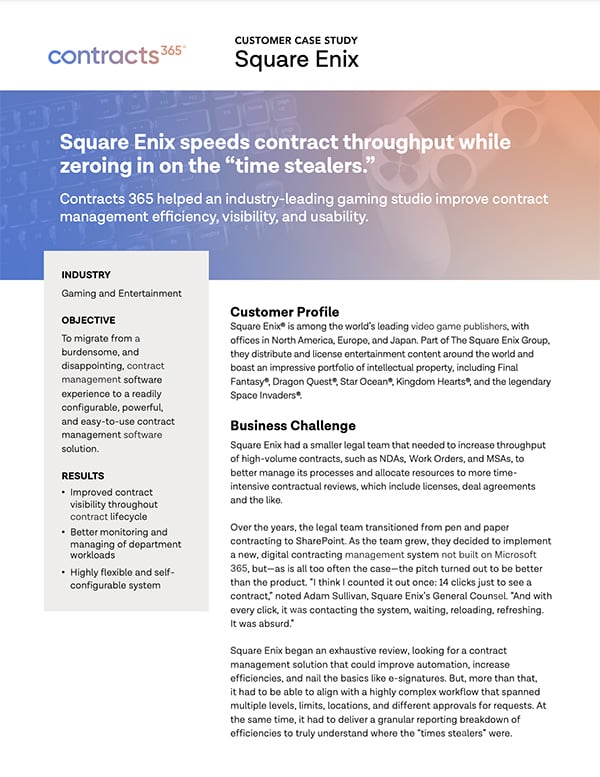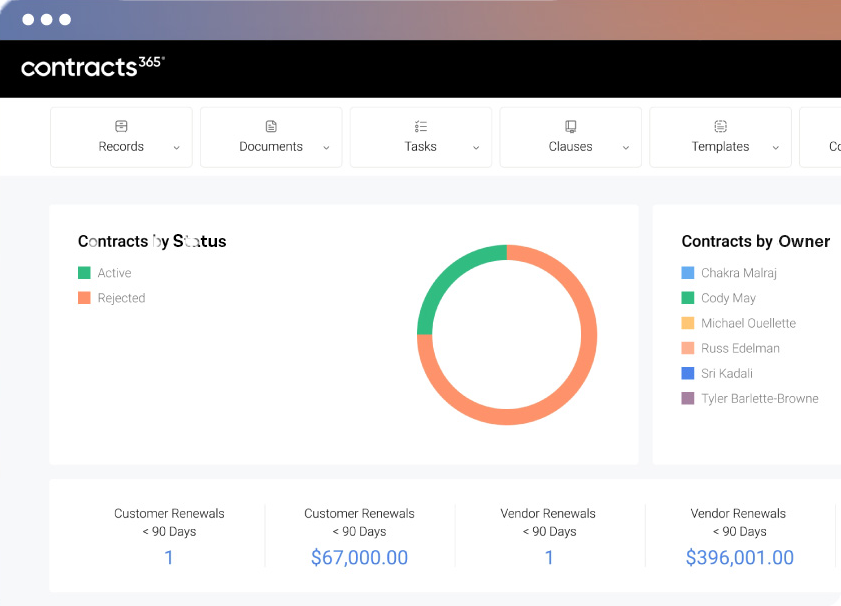7 Factors That Influence the Cost of Implementation
Effective contract management is crucial for keeping your organization running smoothly, mitigating risks, and supporting a healthy bottom line. Because the potential costs of mistakes in the contract management process are high, it’s important to invest in a dependable contract management system. Manual contract management is extremely time consuming, and the cost of hiring specialized personnel like attorneys and contract managers to perform these tasks can demand a large portion of a business’ budget. Fortunately, modern contract management software, also known as CLM software can eliminate the need for many labor-intensive contract management tasks, lightening the burden on your staff and your budget.
What does contract management software do?
Today’s software is revolutionizing contract lifecycle management. Essential features of contract management software include the following:
- Searchable contract repository
- Customizable contract templates
- Collaboration features
- Configurable alerts and notifications
- Compliance features
This combination of features empowers businesses to automate contract creation and the monitoring of important deadlines and deliverables. They make it easier for all parties to collaborate, providing secure cloud storage with permission-based access, enhancing consistency among contracts, and ensuring they meet both internal and regulatory requirements.
.png?width=514&height=442&name=Group%2017%20(1).png)
How much does contract management software cost?
Several factors influence the cost of contract management software. There are some free versions out there and others that cost thousands of dollars per month. What any specific business pays depends on how many people will be using the software, how they’ll be using it, what integrations and customizations are needed, and the level of training and support provided. In this article, we’ll look more closely at seven major factors that affect the cost of contract management software and its potential to deliver a positive return on investment for your business.
1. Company Size
Generally speaking, the more people who will be using your contract management system, the more you can expect it to cost. However, some providers may offer bulk discounts for large numbers of users, and the cost per user can depend on the level of access needed. Consider, however, that wider access to your contract database can be a considerable time saver for your contract management team, who would no longer need to research answers to routine questions from sales or procurement staff. When determining the right spend for your CLM software, it’s important to weigh each aspect of the cost against the benefit it provides.
2. Work Volume
Another major factor in the cost of contract management software is how heavily it will be used. This varies widely across industries and among individual companies. Enterprises with large numbers of contracts with employees, suppliers, distributors, and others need robust storage and search capacity and the ability to maintain perhaps thousands of workflows to keep abreast of negotiations, approvals, signatures, renewals, and other critical processes. On the other hand, smaller companies with simpler operations won’t need to pay for this level of functionality. Whatever the needs of your company, however, it’s wise to select a solution that streamlines your current processes and can also adapt to changing demands as your business grows. To be cost-effective over time, your solution needs to be scalable.
3. Tools and Features
When selecting CLM software, more features and capabilities often mean a greater cost. It's important to ensure your chosen software includes features that meet your needs while avoiding paying for features you will not use. Some essential tools you may want in your contract management system include AI-powered contract management, a self-service portal for authorized users, workflow and assembly automation, custom analytics or reports, and mobile access. These features streamline contract management tasks but may increase the price tag.
4. Integrations
Integrations with the platforms your business already relies on make contract management simpler and more efficient, saving time and money throughout the contract lifecycle. Integrations can allow your employees to collaborate on, modify, complete, store, and search with the systems they know and use daily. They can also dramatically reduce the amount of training your staff will need to effectively use your new contract management software, allowing them to remain focused on work that helps your business grow.
Further, integrations can allow data to be automatically transferred from one tool to another. This not only saves time by eliminating manual tasks but also increases the accuracy of the contract management process. It helps keep all your teams aligned, no matter what parts of the contract management process they’re involved in. Legal teams, contract management, procurement, sales, IT, and executives can all get the access they need when they need it without having to log into a separate app, allowing for faster contract generation and completion.
Integrations tend to increase the cost of CLM software, and in some cases, they may be sold as add-ons. As with the other aspects of a system’s cost, it’s essential to consider the benefit integrations would provide your company. A survey of Contracts 365 CLM users revealed that while businesses that implemented CLM software and then used their CLM software AND customer relationship management (CRM) software separately reduced contract-related administrative tasks by an average of 2.6 hours per week per sales rep, those that integrated their CLM software WITH their CRM platform such as Salesforce or Microsoft Dynamics reduced this administrative work by 4.3 hours per rep.
5. Implementation
Implementing a contract management system can be a significant cost factor. This is the process of setting up the software and migrating data from existing systems. Most contract management software companies also have implementation services; however, this will likely increase the overall cost. To avoid incurring additional fees from scope creep, it is important to have a clear plan for the implementation. This should include the project's scope, including the features and functions that will be implemented, the timeline for implementation, and the project budget.
Once the plan is in place, it is important to set up the fundamental components of the software. This includes creating user accounts, defining roles and permissions, configuring workflows, and building templates. The implementation phase can also be used to create useful automations, such as workflows that automatically trigger notifications or reminders. When done effectively, contract management software implementation will set your company up to save time and money on manual contract management tasks.
6. Training & Support
If your employees aren’t proficient with your contract management software, they’re less likely to use it. Getting all employees who will be interacting with the system up to speed quickly and ensuring they understand how to use it to their best advantage will help maximize the return on your contract management software investment. As mentioned above, integrations can reduce training needs. Even with integrations, however, it’s important to ensure your team has the support they need to get questions answered quickly and understand the full features and functionality available. Naturally, having CLM reps at your employees’ disposal for training, troubleshooting, and answering questions comes with a higher price tag than a system that you figure out on your own. Consider your employee’s capacity for self-training on the new software and the increased efficiency that additional training and support would likely provide.
7. Security
When housing sensitive information in a digital format, security is a big concern. While enhanced security may be an additional upfront cost, a data breach can incur massive fines and penalties that far outweigh the price of a robust security system. For example, a New York-based law firm experienced a cybersecurity incident in 2021 that released confidential data of over 114,000 individuals and incurred a $200,000 settlement penalty. Customers are also more likely to cut ties with companies that experience data breaches, resulting in a loss of profit. It’s vital to ensure that your CLM software features a powerful cybersecurity system to avoid the long-term damage of security breaches.
Download the Square Enix Case Study
Download Now
How do I compare contract management software costs?
With a variety of contract management software products and pricing models to choose from, comparisons can be challenging. Pricing might be subscription-based, per contract, tiered, or customized based on your company’s unique demands. It’s important to assess the total cost of ownership of each contract management system you’re considering, accounting for all the factors discussed above. Watch out for hidden costs like additional charges for implementation, training, support, integrations, upgrades, and overages, and make sure the system is able to scale to accommodate your company’s evolving needs.
Next, consider the return you can expect on that investment, including savings of staff time, risk reduction associated with enhanced accuracy and compliance, faster contract completion, and optimization of renewals. By weighing the costs of various contract management systems against the specific benefits they can deliver for your business, you can select the one that provides the best value.
Contract Management Software Built for Microsoft 365
Contracts 365 is contract management software that’s built for Microsoft 365 users. It uses the existing Microsoft tenant and cloud architecture to provide a secure, comprehensive, and easy-to-use contract management solution. It allows Microsoft 365 users to get more out of the IT investment they’re already making while simplifying the contract management process by letting employees keep the same logins and permissions they use every day. Integrating seamlessly with important tools like Microsoft Dynamics, Salesforce, and popular electronic signature software, Contracts 365 optimizes time savings, compliance, and accuracy in the contract management process.
To learn more, explore the robust features of Contracts 365 and how they can enhance efficiency and reduce risk throughout the contract lifecycle, or view our case studies for an inside look at how this solution has helped businesses like yours.
Subscribe and receive our latest blog articles in your work email.
We value your privacy. By subscribing, you agree to receive our newsletter. We’ll protect your personal data and use your email only for sending useful information. You can unsubscribe anytime. For details on data handling, please see our privacy policy.
Ready to Learn More?
Optimize your team’s contract lifecycle management with Contracts 365®
